After the July 26, 2023 military coup against the democratically elected president of Niger, Mohamed Bazoum, Arab and African intellectual commentators have offered a range of opinions on the root causes of the coup and its implications for France and the region.
Some believe that the coup reflects a growing trend of anti-French sentiment in Africa, which may eventually lead to the end of France's military presence on the continent. Others view it as an internal power struggle among the political and military elites in Niger, partially or fully influenced by France.
The fate of the military junta remains uncertain amid regional and international pressure demanding the reinstatement of Bazoum. The junta faces the possibility of severe economic and political consequences, including potential military intervention.[1] Nevertheless, indications suggest that the coup may be inspired by the prevailing anti-France sentiment in Africa. This sentiment has been exemplified by the attack on the French Embassy in Niamey, the chanting of anti-French and anti-imperialist slogans, and the suspension of uranium exports to France.
Regionally, the transitional military governments in both Burkina Faso and Mali,[2] where French military presence was ended following military coups, have issued a joint statement in support of the military junta in Niger. They have warned that any military intervention against Niger would be considered a declaration of war against Burkina Faso and Mali. Furthermore, the transitional government in Guinea, led by Colonel Mamadi Doumbouya, Guinea's interim president, has expressed its support for the coup in Niger and opposed[3] the sanctions imposed by the Economic Community of West African States (ECOWAS).
This report will explore the various views and reactions of Arab and African intellectuals to the coup in Niger, as well as their speculations regarding its causes and ramifications on France and the region.

On July 28, 2023, Dr. Sam Youssef, a U.S.-based Arabic-language content creator and researcher with over 193,000 Twitter followers, commented on the coup in Niger and its implications for France. He argued that the coup would signify "the end of France as a colonial power and the beginning of its decline as a superpower."[4]
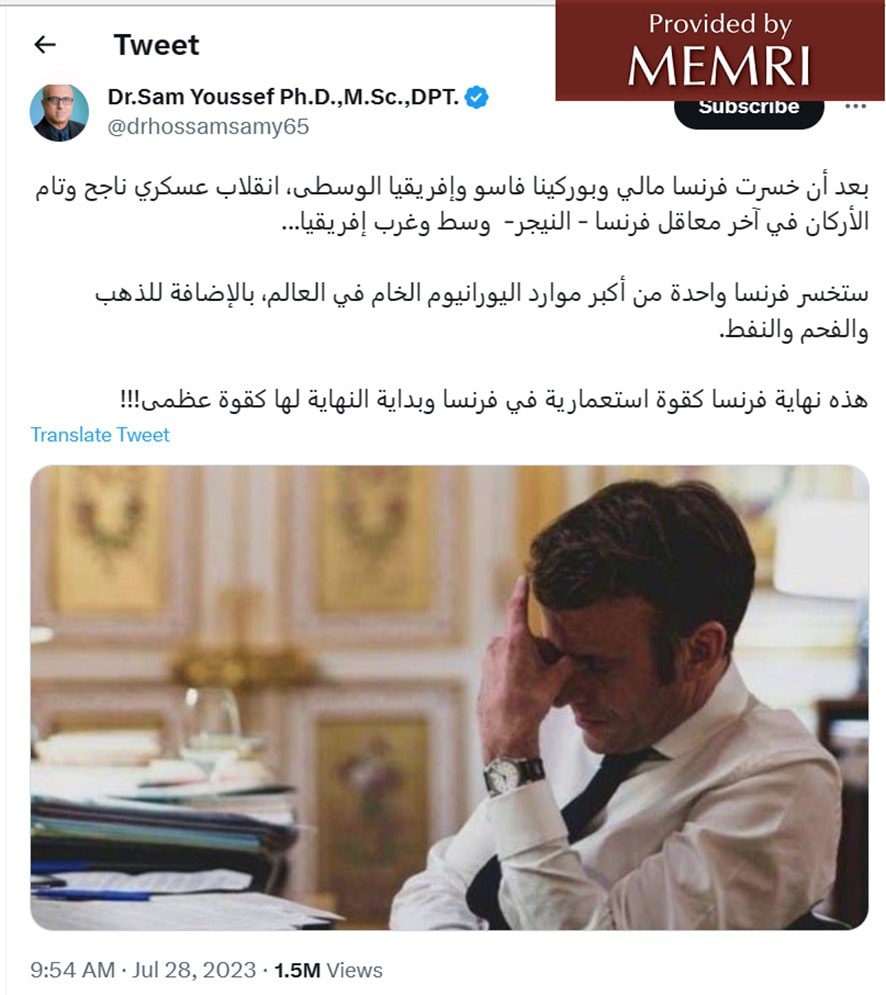
A similar narrative was echoed by Al-Jazeera host Ahmad Mansour, a hardcore Islamist, in a tweet posted on July 30, 2023, in which he wrote: "The fate of 1,500 French soldiers and 1,100 American soldiers stationed at several military bases in Niger remains unknown. France is concerned about the potential halt of uranium exports, on which it relies for 75 percent of its electricity generation. Mali and Burkina Faso have already expelled French soldiers. Consequently, the expulsion of France from Africa would be detrimental to the country."[5]
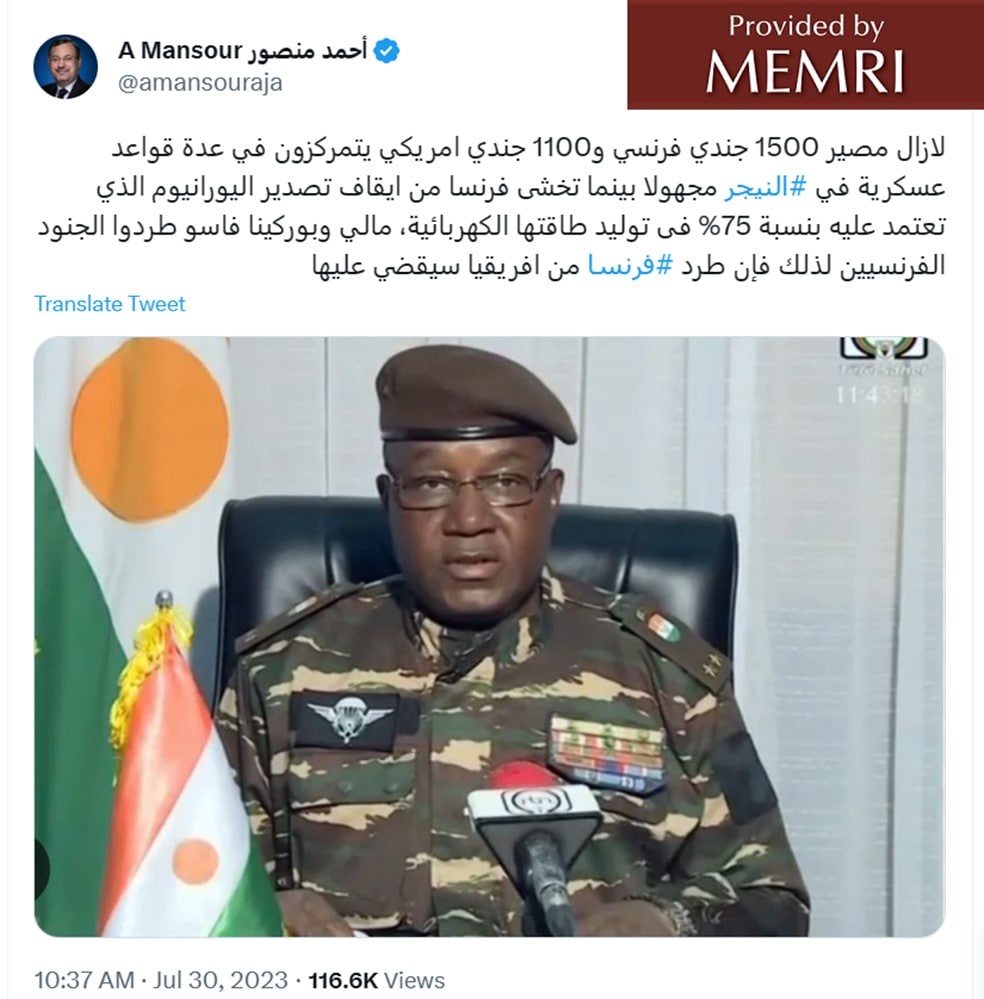
In an interview aired on Sky News Arabic on July 31, 2023, Rwanda-based Chadian journalist Jebren Issa claim that the Nigerien people support the those who overthrew the democratically elected president and stressed that "up until now, France and the West do not understand the prevailing sentiment among Africans, which rejects international and regional interventions." He further argued that if France decided to intervene militarily in Niger, it would lose its presence in other African countries and in the entire continent.
When asked if the Western fear of the growing presence of Russia in Africa was behind the global and regional pressure imposed on the coup leader, he said: "I believe that this is an excuse, not a reality, as the Russian presence is not the main reason behind the movements of the African people. Africa has remained under French direct and indirect exploitation through dictatorial regimes aimed at controlling Africa's resources. Why didn't France, the United States, and Western countries take action when Mohamed Idriss Déby seized power through armed force two years ago without legitimacy? France even supported and praised his actions, as did the African Union and international organizations when they recognized him as president. There is a double standard in the French and Western approach to Africa, and the African nations vehemently reject it. The African people have risen, and they will not rest until the French colonial rule is permanently ousted from Africa, not just Niger."[6]
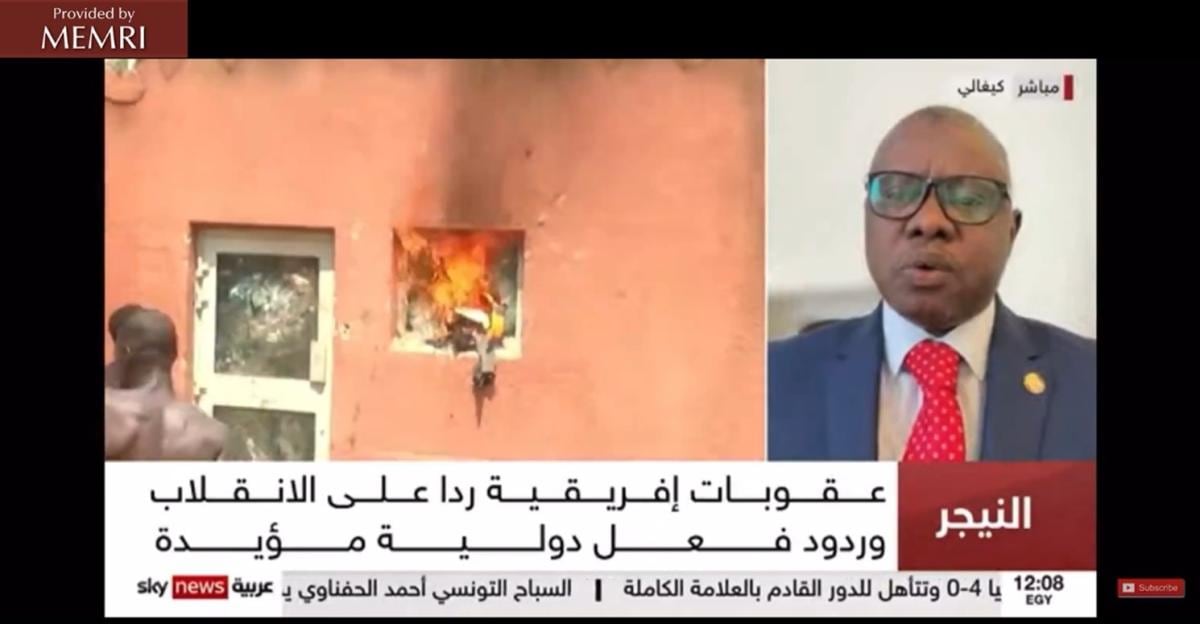
Analyzing the reason behind France's firm stance against the coup, Nigerien professor Abdoul Mouheymine Alamine explained to Al-Hiwar TV on July 31, 2023, that "France's frustration stems from the presence of a powerful popular movement, particularly in neighboring countries like Burkina Faso and Mali, as well as among all African peoples striving for liberation from colonial domination, especially from France, and seeking to break free from the influence of colonial puppets who have embraced French colonial ideas."
Alamine expressed doubts about the possibility of Niger choosing Russia over France and the West. He stated: "It is extremely challenging for Niger to swiftly shift away from its alignment with France, its strong relationship with the country, and the established partnerships, to fall into the embrace of Russia." Additionally, he predicted that France "will do everything within its power to find flexible cooperation, whether with the coup leaders or any authority that will be in Niger."[7]
Regarding the public's reaction to the coup and their organization of anti-France demonstrations, Alamine warned that people can sometimes be deceived in such situations, saying, "The coup orchestrators could have a different intention than the declared one."
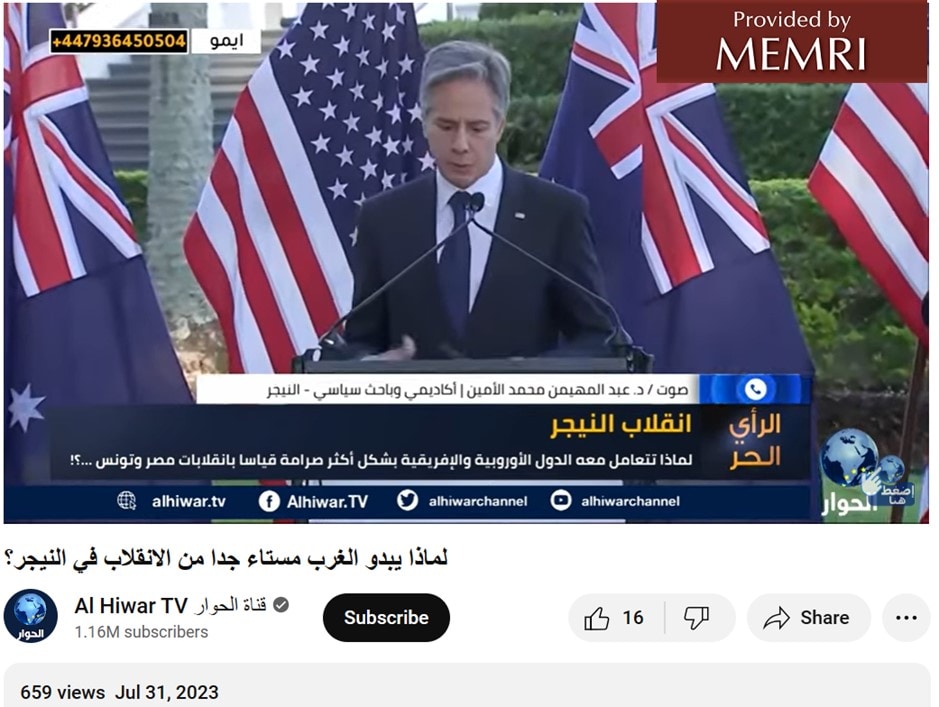
SUPPORT OUR WORK

Nigerien politician and Twitter user Oumar Moctar questioned the "deterioration of the security situation," which those who executed the coup gave as the reason for doing so. He wrote on July 31, 2023: "The military council claims that it has overthrown the ruling party's regime due to the deterioration of security conditions, as if security was not under their control before. However, how can the army rectify the security situation inside the palace and, at the same time, handle the resistance against terrorism and organized crime on its borders? Furthermore, they are even opening a third front with foreign intervention."[8]
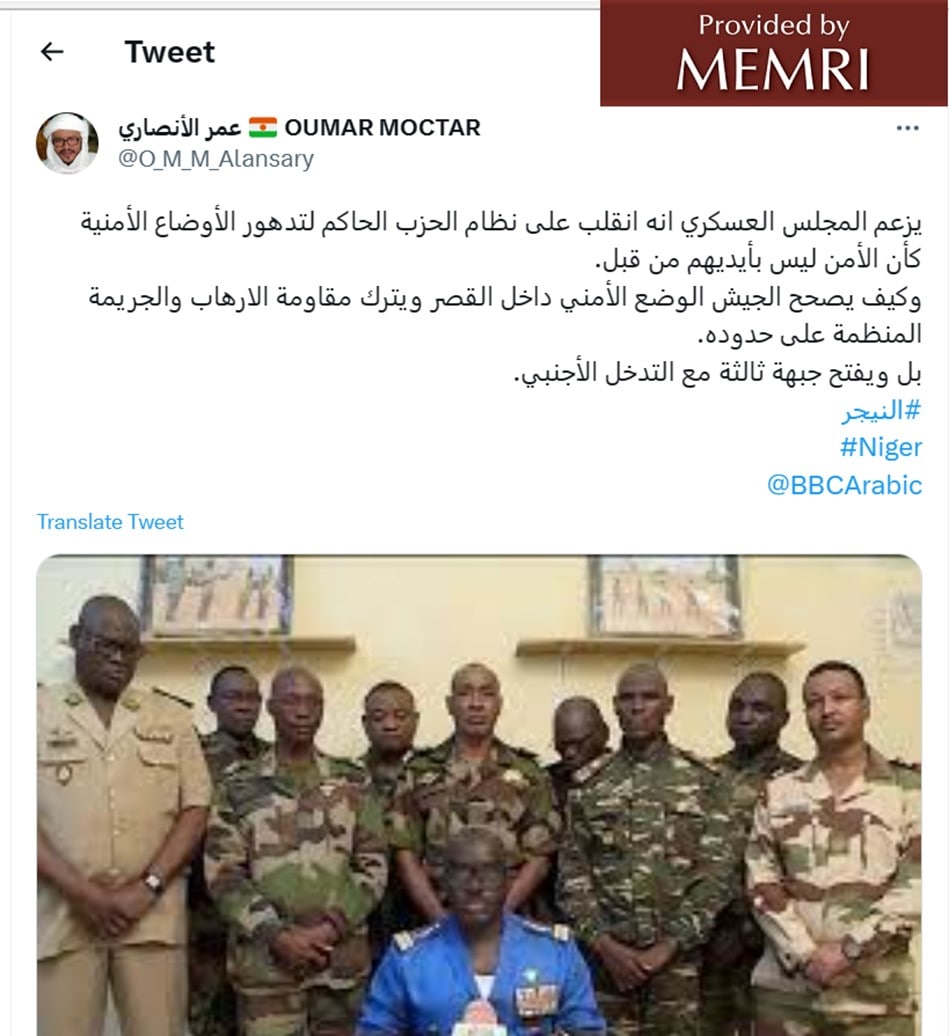
Providing a broader perspective on the series of coups in Western Africa and the Sahel region, Malian writer Diouawaara Hamdy refers to them as "political surgeries aimed at rescuing the countries from the political diseases that have afflicted or almost devastated the region. He seeks to restore these nations to solid foundations, where the highest interest of their homelands becomes their primary concern and comprehensive focus."
In a Twitter thread posted on August 1, 2023, he wrote: "What is happening in Africa is a natural response to a strong popular desire to break free from Western and imperial dominance, which we merely label as coups from a Western perspective. However, the reality might be different."
He further accused the West of applying a double standard to Africa, saying: "When our countries requested a billion Euros for the war on terrorism, it has not been provided to this day. However, when the war drums sounded in Ukraine, they managed to gather more than 500 billion Euros for it and spent it in this war." According to him, African political leaders conspire with the West to further this "imperialist policy" by "signing military deals with NATO and others and building military bases not for the purpose of assisting our countries but solely for their own interests."[9]
Speculating about the future, he concluded by saying: "These coups, which everyone observes as people rallying around them, are a natural outcome of the political awareness that the African people have achieved. They are no longer oblivious to the schemes plotted against their countries through their leaders, who have willingly given their leashes to the West to lead them wherever it desires."
"I believe that this political version that has emerged in the region will lead to a new era for the region. It will encourage other nations to unite around the critical issues of the continent, such as freedom, independence, good governance, and breaking free from the cleverly imposed shackles on these liberated nations by colonial powers."

Sudanese writer Azmi Abd Al-Raziq presented a different, yet complex perspective on the coups in the former French colonies. In an article published on Aljazeeramubasher.net on July 28, 2023, he wrote: "Perhaps the hidden motives behind these coups lies in France's desire to alter the course of governance in its former colonies according to its economic interests. However, the recent emergence of the Russian bear and the Chinese dragon has significantly complicated matters in this region, pulling it away from the influence of the French rooster. As a result, the Sahel and West Africa have turned into volatile stations of conflicts, marred by military coups, as witnessed in Mali, the Central African Republic, and Burkina Faso. What is happening in Sudan today is not far from that international conflict, with agendas and ambitions intersecting in the quest for control over gold and uranium."[10]
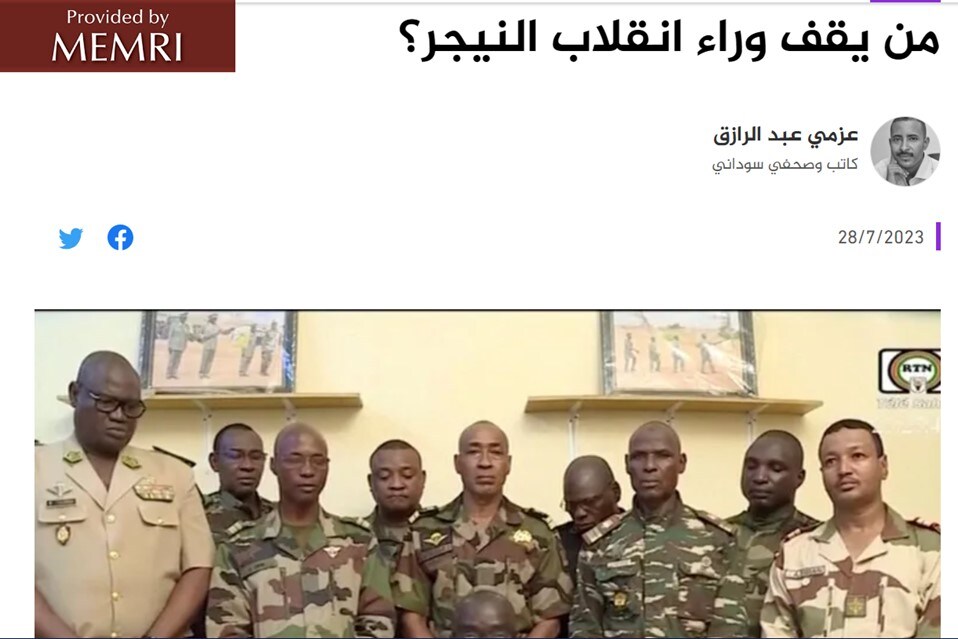
Some argue that the coup was driven more by internal power dynamics within the political elites in Niger and was not related to anti-France sentiment in the region. In fact, some claim that the coup leader, Gen. Abdourahmane Tchiani, is even more pro-France than the ousted president.
On July 28, 2023, Algerian TV host Hafsi Ahmed wrote: "Tchiani was the shadow man of the overthrown president and the eyes of Paris that never sleep in the presidential palace. He foiled coup attempts in Niger with French support in 2015 and 2021."[11]
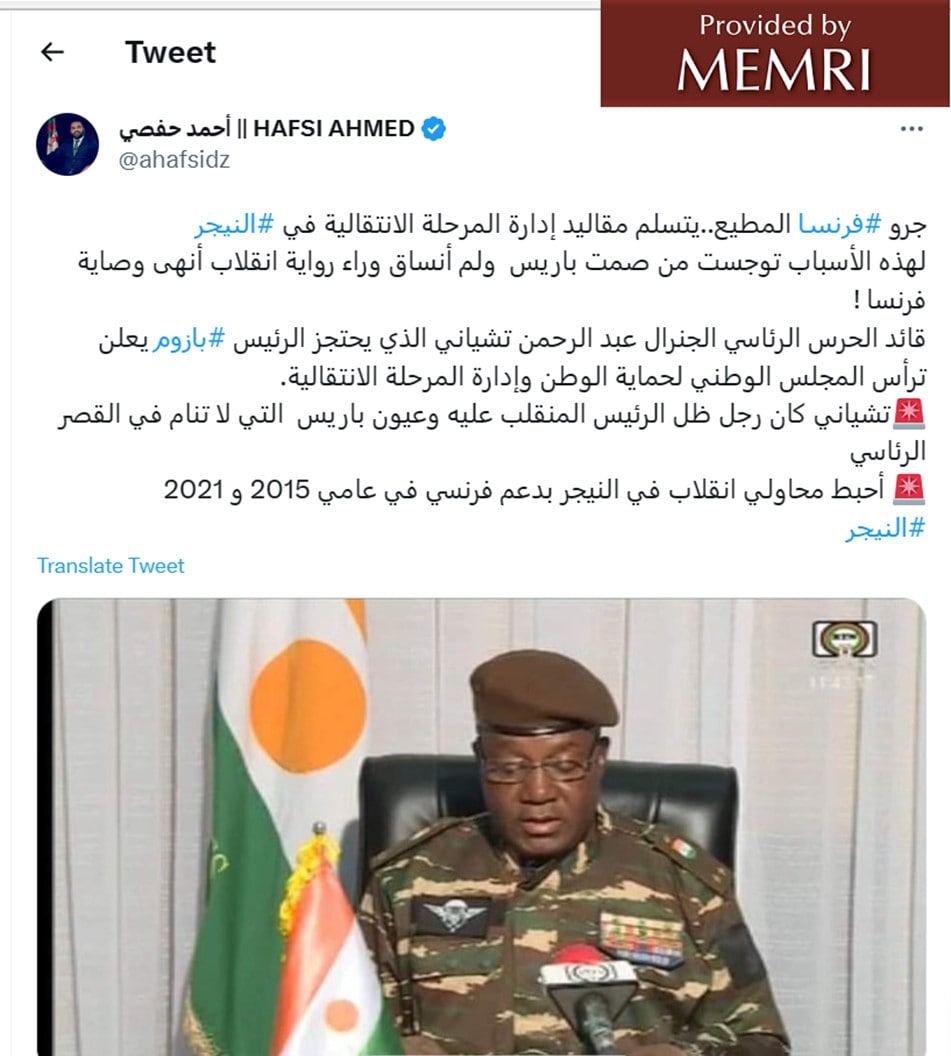
Pro-coup advocates downplayed President Bazoum's democratic election and suggested that France should stop stealing Niger's resources before promoting democracy to Niger. In a tweet posted on August 2, 2023, British-Bahraini commentator Amjad Taha, who has over 477,000 Twitter followers on Twitter, wrote that "Morsi and Hitler came to power through elections, and the people revolted against them, and with the strength of the military, they were ousted. Overthrowing a democratic system that keeps people hungry is a legitimate act. Any attack on Niger is a threat to international security. For your information, 80 percent of Niger has no electricity, while 15 percent of France's electricity comes from Niger. Before you sell them democracy, stop stealing from them."[12]
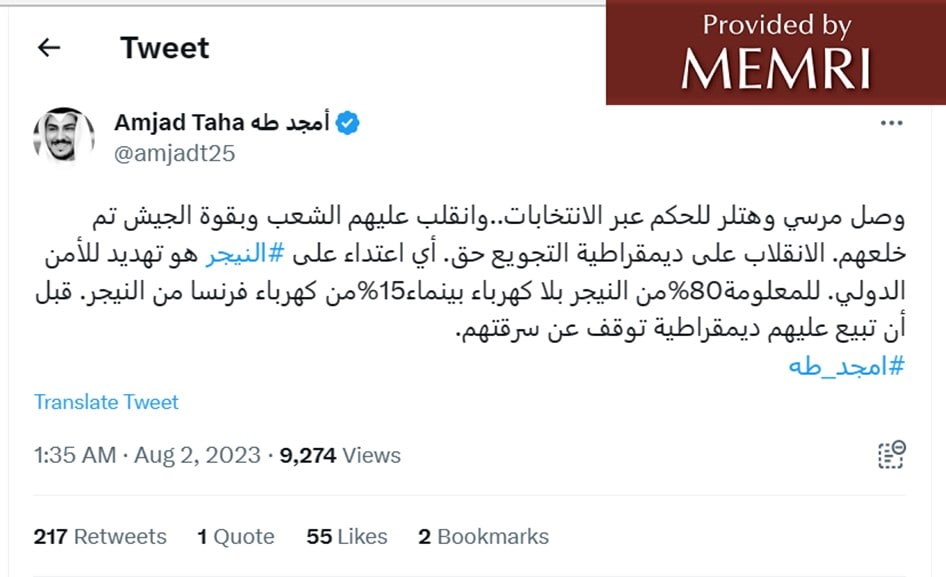
British-Palestinian journalist Abdel Bari Atwan also expressed his support of the coup in Niger which he described as "the final nail in the coffin of French plundering of Africa" and argued that Russia has emerged victorious and is replacing France in Africa. In a TikTok video posted on August 1, 2023, he praised Africans saying that they have a "high awareness level. They no longer accept being the milking cow for France, providing their wealth and valuable minerals from their lands. There is an extraordinary awareness in the African continent, with its main motto being 'No to French presence.'"
Justifying his support for the coup in Niger, despite being against coups in general, he said: "We are not in favor of coups, but we stand for the interests of the African continent. We have witnessed demonstrations in support of this military coup, where Russian flags were raised, and cheers were heard for Russian President Putin. This clearly reveals that Russia is now replacing France in Africa, and China's presence has also become significant there."[13]

The public support of the coup was further justified by Nigerian Twitter user Idris Sanusi, who also mocked democracy advocates who he says do not understand the reality in West Africa. In a Tweet he posted on August 2, 2023, he wrote: "It is extremely ironic for those who do not understand the situation in West Africa/Africa to lecture us about democracy and the dangers of coups! In the 60 so-called 'independent' countries, there are nations where the presidency is passed from father to son, like Gabon! There is nothing but corruption and manipulation of constitutions, so how can there not be popular support for coups?!"[14]
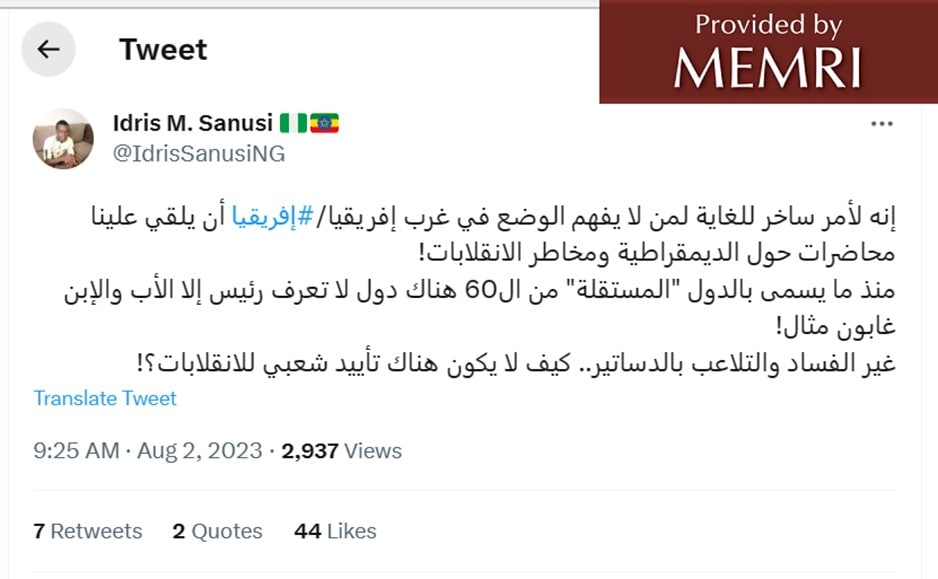
[1] France24.com/en/africa/20230730-ecowas-set-to-meet-on-niger-coup-leaders-say-bloc-planning-military-intervention, July 30, 2023.
[2] France24.com/en/africa/20230801-burkina-faso-and-mali-say-intervention-in-niger-would-be-declaration-of-war, August 1, 2023.
[3] Apanews.net/2023/08/01/guinea-dissociates-itself-from-ecowas-sanctions/, August 1, 2023.
[4] Twitter.com/drhossamsamy65/status/1684925393818513409, July 26, 2023.
[5] Twitter.com/amansouraja/status/1685660818493280257, July 30, 2023.
[6] Twitter.com/jebren_/status/1685967005164208128, July 31, 2023.
[7] Youtube.com/watch?v=Xjh7VZuLuzs, July 31, 2023.
[8] Twitter.com/O_M_M_Alansary/status/1685907451617447936, July 31, 2023.
[9] Twitter.com/HamdyDiouara/status/1686264673081966593, August 1, 2023.
[10] Aljazeeramubasher.net/opinions/2023/7/28/من-يقف-وراء-انقلاب-النيجر؟?sf180501598=1, July 28, 2023.
[11] Twitter.com/ahafsidz/status/1684945935413936128, July 28, 2023.
[12] Twitter.com/amjadt25/status/1686611727398395904, August 2, 2023.
[13] Tiktok.com/@abdelbari.atwan/video/7262393390824705313, August 1, 2023.
[14] Twitter.com/IdrisSanusiNG/status/1686730020511682562, August 2, 2023.




